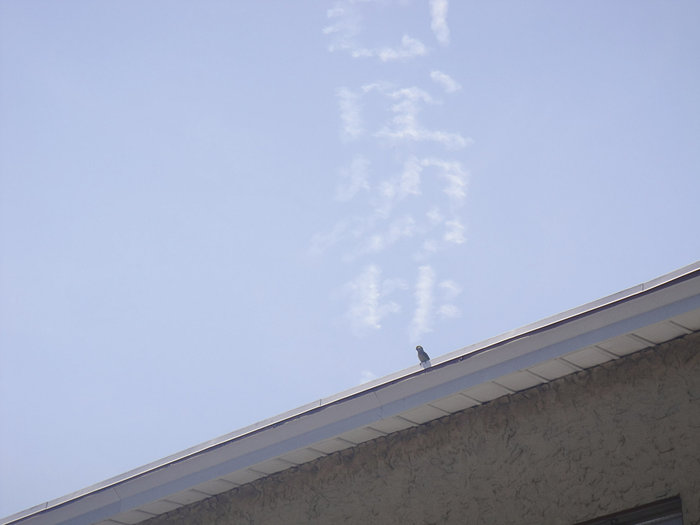The Lowe’s Home Improvement store on Tonnelle Avenue has some new flying neighbors: the green Quaker Parrots, which are sometimes referred to as Monk Parakeets. The parrots and their giant nests have been a familiar sight along River Road in Edgewater for more than 30 years, and seem to have recently migrated in small flocks to North Bergen. They originate from South America and are rumored to have escaped from a broken shipping crate at JFK Airport in the 1970s.
Nesting parrots
Quakers are the only parrots that construct nests, and a very visible one has been built on a utility pole in front of Lowe’s. The large nest consists of woven twigs or vines that are placed together.
Alison Evans-Fragale, an advocate for the birds, created the website edgewaterparrots.com and is the founder of the Edgewater Parrots Foundation. According to the site, Quakers often choose to construct their nests in places which they know will provide warmth, such as near electrical power transformers and lights.
“They are from an area of South America that has a climate similar to ours.” – Alison Evans-Fragale
____________
Company policy did not allow Lowe’s management to disclose any information about their feathered neighbors other than the fact that they have been there for quite some time.
Friend or foe?
According to edgewaterparrots.com, in the 1970s lawmakers became concerned that the Quaker populations would pose a threat to agriculture and other animals, even though the website says they are sociable birds.
Assemblywoman Joan Voss (D – 38th) said in May 2007, legislation to remove the parrots from the state’s list of potentially dangerous species passed in the Assembly but stalled in the Senate. Legislation to remove them was also introduced in 2010 but has yet to be passed.
PSE&G considers the nests a potential fire hazard. The parrot advocates reached a truce with PSE&G, who agreed not to remove the nests during breeding season. Prior to that, they tore them down during breeding season, which may have harmed the parrots.
“We remove the nests each spring to ensure the integrity of the electrical system,” said PSE&G officials last week. “The birds are attracted to heat given off by transformers and other equipment high up on the poles. Nests often damage electrical equipment by engulfing the electrical devices, which blocks ventilation. The resulting trapped heat can cause devices to short-circuit, leading to local power failures. Our procedure is to try to remove the nests before the breeding season.”
Evans-Fragale’s website said the parrots were blamed for two fires in Edgewater that occurred in 1998 because of their nests, although the site claims that one was due to lightning and the other was caused by a burning cigarette. One fire led to an hour long of power loss.
Residents weigh in
The parrots are normally spotted on the side of Lowe’s closest to the McDonald’s near some cliffs.
“I’ve seen them for seven years now,” said North Bergen resident Ralfy Sanchez.
“I’ve seen them two or three times,” said West New York resident Adrian Suarez. “Yesterday when I passed, they were here.”
Even some residents from more distant towns are drawn to the parrots.
Lyndhurst resident Julian Cordova noticed another effect of the birds’ presence.
“There seem to be less pigeons,” she said.
Vanessa Cruz can be reached at vcruz@hudsonreporter.com
